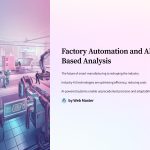 The Factory Automation Engineer (FAE) written exam is designed to assess candidates’ knowledge in automation systems, control technologies, and industrial processes. This exam covers a wide range of topics, from basic automation concepts to more advanced industrial control systems. Below, we explore some of the common past questions and essential topics that often appear on the exam.
The Factory Automation Engineer (FAE) written exam is designed to assess candidates’ knowledge in automation systems, control technologies, and industrial processes. This exam covers a wide range of topics, from basic automation concepts to more advanced industrial control systems. Below, we explore some of the common past questions and essential topics that often appear on the exam.

Introduction to Factory Automation
Factory automation involves the use of control systems, such as computers, robots, and information technology, to handle different processes in manufacturing plants and industries. These systems improve efficiency, precision, and reduce human intervention. A key part of the Factory Automation Engineer exam is understanding the basics of automation, including control systems, sensors, actuators, and robotics.
Common Topics:
- Basics of PLC (Programmable Logic Controllers)
- Sensors and actuators in automation
- Control system types and applications
- Introduction to industrial robots and their integration
- Communication protocols in automation (Modbus, Profibus, etc.)

Electrical and Control Systems
A significant portion of the exam is dedicated to electrical systems and the integration of control systems in automation processes. This includes understanding circuit diagrams, wiring methods, and control principles for automated machines and systems.
Common Topics:
- Electrical diagrams and symbols
- Motor control circuits
- Control panel design and wiring
- Safety systems in automation (e.g., emergency stop systems)
- Power supply and distribution in automation systems

Programmable Logic Controllers (PLC)
PLCs are at the heart of most factory automation systems. The exam will often feature questions on PLC programming, troubleshooting, and system integration.
Common Topics:
- Basic PLC architecture and components
- Ladder logic programming
- PLC input/output modules and their functions
- Troubleshooting PLC systems
- Programming languages used in PLCs (e.g., Ladder Logic, Function Block, Structured Text)

Industrial Communication Networks
Communication is crucial in automation systems, where data needs to be transmitted between controllers, sensors, and devices. Understanding industrial communication protocols and networks is key for the exam.
Common Topics:
- Ethernet, Modbus, Profibus, and CAN bus
- Communication protocols in automation systems
- Industrial network design and configuration
- Integration of PLCs with SCADA systems
- Troubleshooting communication issues

Robotics and Automated Machinery
Robotics plays a significant role in factory automation, particularly in tasks that require precision, speed, and consistency. The exam may include questions related to robotic systems, their components, and integration into automated production lines.
Common Topics:
- Types of industrial robots (articulated, SCARA, delta, etc.)
- Robot programming and control
- Automated guided vehicles (AGVs)
- Robotics integration with PLCs and SCADA systems
- Vision systems and sensors in robotics

Process Control and SCADA Systems
Supervisory Control and Data Acquisition (SCADA) systems are widely used for monitoring and controlling industrial processes. The written exam may include questions about SCADA systems, their architecture, and their role in automation.
Common Topics:
- SCADA system components (RTUs, PLCs, HMI, etc.)
- Process control loops (PID control)
- Data acquisition and visualization in SCADA
- Alarm and event management
- Remote monitoring and control
Conclusion
The Factory Automation Engineer written exam tests a broad spectrum of knowledge related to the design, implementation, and maintenance of automation systems in industrial environments. By understanding the key topics and practicing past exam questions, candidates can improve their chances of passing the exam and advancing their careers in automation.
Q&A
Q: What are the most important topics to focus on for the Factory Automation Engineer written exam?
A: Focus on PLC programming, electrical control systems, industrial communication networks, and process control systems, as these areas are most commonly tested.
Q: How can I prepare effectively for the exam?
A: Study past exam questions, review key topics in control systems, PLCs, and automation networks, and practice hands-on troubleshooting to gain practical experience.
Final Thoughts
Factory automation is an evolving field with advancements in robotics, control systems, and data communication. By thoroughly understanding the exam topics and practicing problem-solving, candidates will be well-prepared for the Factory Automation Engineer written exam.
Tags:
factory automation, PLC programming, robotics in automation, process control, industrial communication, SCADA systems, automation engineer exam, control systems, industrial robots, electrical control circ
*Capturing unauthorized images is prohibited*



